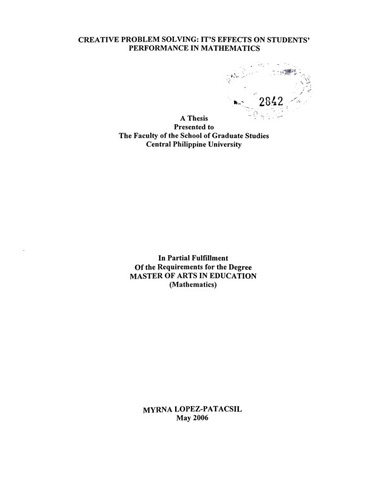Creative problem solving: it’s effects on students’ performance in mathematics

Page views
1,580Date
2006Author
Thesis Adviser
Defense Panel Chair
Share
Metadata
Show full item record
Abstract
This study was conducted to determine the effect of creative problem solving strategy on the performance of students in mathematics problem solving. The study sample comprised of 30-paired teacher education students of Aklan Catholic College. The study adapted the experimental pretest posttest control group. The experimental group was exposed to creative problem solving while the control group was exposed to the traditional method of teaching problem solving.
A 10-item teacher-made test was utilized to measure performance. Means, percentages, standard deviation were used for the descriptive analysis. T-test was used to determine the significance of the difference between the values of variables identified and z-test for the difference in proportions of the students in the experimental and control group. The significance level of all tests was set at 5 percent level.
Results of the study revealed that both the experimental and control groups have poor level of performance before the treatment. Since there is no significant difference between their pre-experiment mean scores, the two groups were comparable in their mathematical abilities during the pre-intervention period. After the intervention, the level of performance of the experimental group changed to satisfactory while the level of performance of the control group changed to fairly satisfactory. A significant difference between the mean scores of the two groups was found.
This means that creative problem solving approach results to better performance of the students in problem solving than the traditional method. Both the experimental and control groups performed significantly better after the treatment. Both teaching strategies effectively helped students improve their problem solving performance. There is however a significant difference between the mean gain of the experimental group and that of the control group in favor of the former. This means that creative problem solving approach is an effective strategy than the traditional approach in improving students’ performance in mathematics. Creative problem solving strategy works more effectively among poor students than among brighter ones.
Description
Abstract only
Suggested Citation
Patacsil, M. L. (2006). Creative problem solving: it’s effects on students’ performance in mathematics (Unpublished Master's thesis). Central Philippine University, Jaro, Iloilo City.
Type
ThesisSubject(s)
Department
School of Graduate StudiesDegree
Master of Arts in Education (Major in Mathematics)Shelf Location
GSL Theses 378.242 P27
Physical Description
viii, 77 leaves

